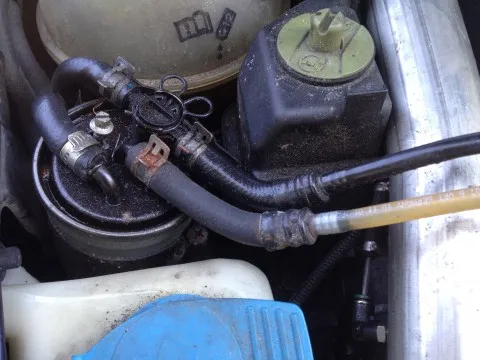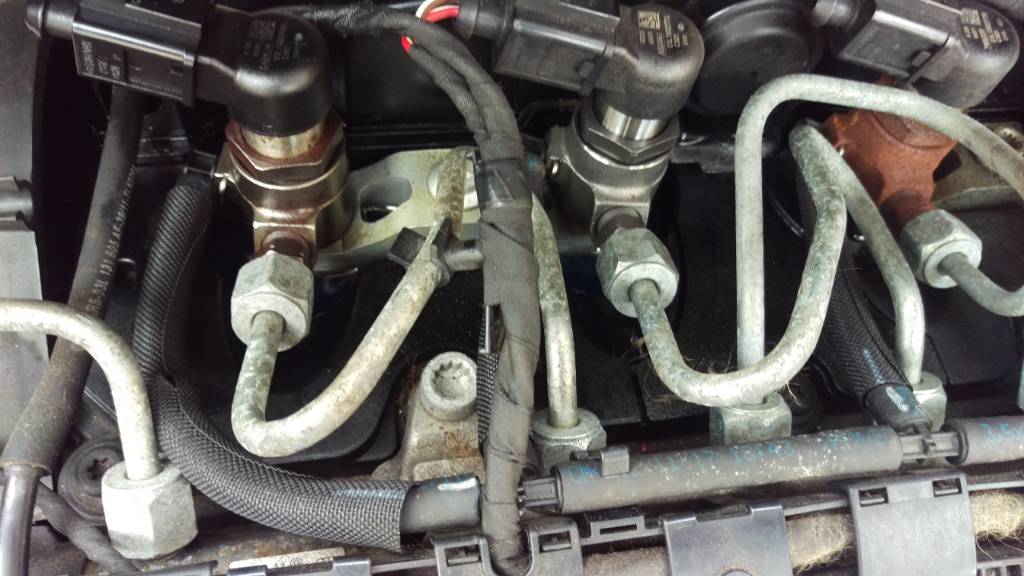A diesel return pipe leak in a vehicle’s fuel system can manifest through several noticeable symptoms. The most common indicator is a strong diesel fuel odor both inside and outside the vehicle. Visible fuel leaks, particularly around the fuel tank or along fuel lines, often accompany this issue.
Reduced fuel efficiency, evidenced by a drop in miles per gallon (MPG), can result from inadequate fuel reaching the engine due to the leak. Engine performance problems such as rough idling, stalling, or hesitation during acceleration may occur. The leak could trigger the check engine light on the dashboard, signaling potential fuel system issues.
Additionally, an excessively rich fuel-air mixture caused by the leak might produce black smoke from the exhaust. Starting difficulties or a failure to start can arise if air enters the fuel system due to a significant leak.
What are common symptoms of a Diesel Return Pipe Leak?

If you suspect a diesel return pipe leak or notice any of these symptoms, it’s crucial to address the issue promptly. Ignoring a fuel leak can pose safety hazards due to the flammability of diesel fuel and can also lead to long-term engine damage or poor performance. It’s advisable to have a qualified mechanic inspect and repair any suspected leaks in the fuel system.
Strong Diesel Odor
When a diesel return pipe develops a leak, it often results in a noticeable diesel fuel smell inside and outside the vehicle. This odor is distinct and can be particularly strong, indicating a potential leak in the fuel system. The scent may permeate the interior cabin and may also be detectable around the exterior, especially when the vehicle is stationary or running.
Visible Fuel Leaks
Leakage around the fuel tank or along the fuel lines becomes apparent when a diesel return pipe is compromised. Signs of fuel seepage or visible wet spots around the fuel tank area or running along the fuel lines are indicative of a leak. These leaks might present as drips, puddles, or wet patches underneath the vehicle, requiring prompt attention to prevent safety hazards and fuel wastage.
Decreased Fuel Efficiency
One of the more subtle yet telling symptoms of a diesel return pipe leak is a reduction in fuel efficiency. This manifests as a noticeable drop in miles per gallon (MPG). The leak leads to an insufficient amount of fuel reaching the engine, causing a decrease in the vehicle’s overall fuel efficiency and requiring more frequent refueling.
Engine Performance Issues
A compromised diesel return pipe affects the engine’s performance. Common issues include rough idling, where the engine may feel unstable or vibrate unusually while stationary. Stalling or hesitation during acceleration is another symptom, indicating a lack of proper fuel delivery due to the leak.
Check Engine Light
When a diesel return pipe leaks, it can trigger the vehicle’s onboard diagnostic system, causing the check engine light to illuminate on the dashboard. This light serves as an alert, indicating potential problems with the fuel system that require inspection and repair.
Smoke from Exhaust
A leaking return pipe can lead to an overly rich fuel-air mixture, resulting in the emission of black smoke from the exhaust. This smoke is a consequence of incomplete combustion due to an imbalance in the fuel-air ratio, caused by the leak in the fuel system.
Difficulty Starting the Engine
Air entering the fuel system due to a significant leak can make starting the engine challenging or lead to a complete failure to start. The presence of air disrupts the fuel flow, affecting the engine’s ability to initiate combustion properly, resulting in starting issues.
How important is addressing Diesel Return Pipe Leaks?

Addressing diesel return pipe leaks promptly is crucial not only to ensure vehicle safety and performance but also to mitigate potential environmental harm and prevent costly damage to vehicle components and the engine. Regular inspections and timely repairs by qualified mechanics are essential to maintain a safe and efficient vehicle while minimizing adverse effects on the environment.
Potential Safety Hazards Associated with Fuel Leaks
Fuel leaks from a diesel return pipe pose significant safety hazards. The leaked fuel is highly flammable, increasing the risk of fire or explosion, especially in the presence of heat sources or sparks.
Additionally, fuel leaks create a slippery surface, increasing the likelihood of accidents due to reduced traction. In enclosed spaces, such as garages or parking structures, the accumulation of fuel vapors can heighten the risk of asphyxiation or fire.
Environmental Impact of Leaking Diesel Fuel
Leaking diesel fuel from a return pipe can have adverse effects on the environment. Diesel is a petroleum product that contains pollutants harmful to soil, water, and wildlife. Fuel leakage contaminates soil, affecting its fertility and damaging vegetation.
When leaked fuel enters water bodies through runoff or seepage, it can harm aquatic life and disrupt entire ecosystems. Additionally, diesel fuel emissions contribute to air pollution, impacting air quality and human health.
Risks of Damage to Vehicle Components and Engine Functionality
Ignoring diesel return pipe leaks can lead to extensive damage to various vehicle components and the engine itself. Continuous exposure to leaked fuel can corrode and degrade components such as rubber seals, hoses, and connectors in the fuel system. Prolonged exposure to fuel can also damage sensitive engine parts, including fuel injectors and the fuel pump, leading to costly repairs or replacements.
Furthermore, inadequate fuel delivery resulting from leaks can cause the engine to run inefficiently or even suffer permanent damage, affecting its performance and longevity.
FAQ’s
What does a diesel leak off pipe do?
A diesel leak off pipe is part of the fuel system that returns excess fuel from the injectors back to the fuel tank, preventing pressure buildup and ensuring proper injector functioning.
What happens if a pipe leaks?
If a diesel leak off pipe or any other diesel fuel line leaks, it can lead to fuel wastage, reduced engine performance, fuel odor, potential engine misfires, and, in severe cases, a risk of fire due to the flammability of diesel fuel.
What happens when a pipe leaks?
When a diesel pipe leaks, it can cause fuel to escape, leading to decreased fuel efficiency, potential engine performance issues, the smell of diesel, and, if left unattended, possible environmental hazards due to fuel leakage.
How do I find a leak in my diesel fuel line?
You can find a diesel fuel line leak by inspecting the fuel lines visually for signs of wetness, smelling for the characteristic diesel odor, using a UV dye or a fuel leak detection kit, or pressurizing the system to spot leaks via fuel spraying.
How do I know if my diesel injectors are leaking?
Signs of leaking diesel injectors include rough idling, black smoke from the exhaust, decreased fuel efficiency, fuel odor around the engine, or visible fuel leaks near the injectors.
How do you treat a diesel leak?
Treating a diesel leak involves identifying the source, repairing or replacing the damaged component, ensuring proper tightening of connections, and, if necessary, using appropriate sealants or replacement parts recommended for the fuel system.
Final Words
In conclusion, dealing with Diesel Return Pipe Leaks is crucial for your safety, the environment, and your vehicle’s health. Leaks can lead to dangerous situations due to flammable fuel, slippery surfaces, and potential fire hazards. They harm nature by contaminating soil, water, and impacting wildlife. Ignoring leaks can damage your vehicle’s important parts like hoses, pumps, and the engine, causing costly repairs. It’s essential to act swiftly, fixing leaks promptly with professional help to keep you safe, protect our environment, and maintain your vehicle’s performance and longevity.

